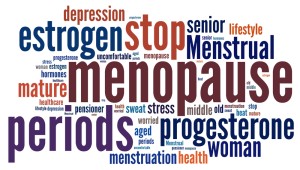Written by Jessica Patella, ND. A combination of fermented soy and resveratrol, a source of plant estrogens, significantly improved sleep, depression, and sexual problems in 60 menopausal women.
 Menopause is defined as the loss of menses for one year and is characterized by lower levels of estrogen and progesterone 1,2. Menopause symptoms that are related to a lower quality of life for menopausal women include hot flashes, sleep disturbances, anxiety and depression 1,3. The most common treatment for these symptoms is hormone replacement therapy, but this comes with concerns of increased risk for breast cancer and cardiovascular disease 1,4. Recent research has found that supplementing with equol and resveratrol can improve the quality of life in menopausal women 1.
Menopause is defined as the loss of menses for one year and is characterized by lower levels of estrogen and progesterone 1,2. Menopause symptoms that are related to a lower quality of life for menopausal women include hot flashes, sleep disturbances, anxiety and depression 1,3. The most common treatment for these symptoms is hormone replacement therapy, but this comes with concerns of increased risk for breast cancer and cardiovascular disease 1,4. Recent research has found that supplementing with equol and resveratrol can improve the quality of life in menopausal women 1.
Equol and resveratrol are both phytoestrogens, meaning they are plant estrogens. Equol is the end product of soy isoflavone (diadzein) metabolism that is produced by gut bacteria 1. Resveratrol is an antioxidant in grapes. The combination of equol and resveratrol has been shown in previous research to improve the symptoms of perimenopause in women 5.
The research included 60 menopausal women (aged 50-55 years). They were randomly divided into a placebo group (n=30) and a treatment group (n=30). The treatment group took a daily supplement of 200 mg fermented soy (which contained 10 mg equol) and 25 mg of resveratrol (from Vitis vinifera).
The women completed the following rating scales and profile before starting supplementation and again after 12 weeks of supplementation 1:
- The Menopause Rating Scale to evaluate the severity of their menopause symptoms
- The Hamilton Rating Scale for Depression to evaluate depression and anxiety
- The Nottingham Health Profile to measure sleep quality
The following results were observed in the women taking the supplement compared to placebo:
- A significant decrease in vaginal dryness in those on the supplement (-85%; p<0.001)
- A significant decrease in heart discomfort in those on the supplement (-78.8%; p<0.001)
- A significant decrease in sexual problems in those of the supplement (-73.3%, p<0.001)
- A significant improvement in work and activities (94.1%; p<0.001; based on depression scale)
- Significant improvements in sleep (p<0.001; based on the sleep quality scale)
This was the first human study to investigate the effect of equol and resveratrol on quality of life in menopausal women.
In conclusion, a combination of equol and resveratrol was effective in improving symptoms of menopause and improving the quality of life for women in menopause 1. Replication of results in a larger scale study is warranted.
Source: Sergio Davinelli, et al, “Influence of equol and resveratrol supplementation on health-related quality of life in menopausal women: A randomized, placebo-controlled study” in the 96th edition of 2017 in the publication of Maturitas.
Posted February 6, 2017.
Jessica Patella, ND, is a naturopathic physician specializing in nutrition and homeopathic medicine and offers a holistic approach to health. She earned her ND from Southwest College of Naturopathic Medicine in Tempe, AZ, and is a member of the North Carolina Association of Naturopathic Physicians. Visit her website at www.awarenesswellness.com.
References:
- Davinelli S, Scapagnini G, Marzatico F, Nobile V, Ferrara N, Corbi G. Influence of equol and resveratrol supplementation on health-related quality of life in menopausal women: A randomized, placebo-controlled study. Maturitas. 2017;96:77-83.
- Hale GE, Zhao X, Hughes CL, Burger HG, Robertson DM, Fraser IS. Endocrine features of menstrual cycles in middle and late reproductive age and the menopausal transition classified according to the Staging of Reproductive Aging Workshop (STRAW) staging system. The Journal of Clinical Endocrinology & Metabolism. 2007;92(8):3060-3067.
- Jaspers L, Daan NM, Van Dijk GM, et al. Health in middle-aged and elderly women: a conceptual framework for healthy menopause. Maturitas. 2015;81(1):93-98.
- Rossouw JE, Prentice RL, Manson JE, et al. Postmenopausal hormone therapy and risk of cardiovascular disease by age and years since menopause. Jama. 2007;297(13):1465-1477.
- Davinelli S, Sapere N, Visentin M, Zella D, Scapagnini G. Enhancement of mitochondrial biogenesis with polyphenols: combined effects of resveratrol and equol in human endothelial cells. Immunity & Ageing. 2013;10(1):28.
